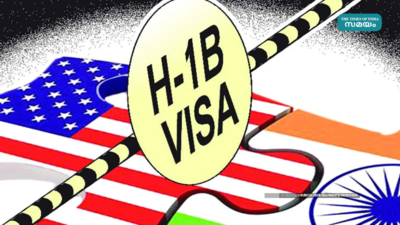ARTICLE AD BOX

Universities may lose global talent as H-1B visa exemption faces removal
Thousands of international scholars and students in the US face an uncertain future following a proposed change to the H-1B visa programme. A federal rule under review could eliminate the exemption that currently allows US universities and nonprofit research institutions to hire foreign workers without being subject to the annual H-1B visa cap.For years, this exemption served as a critical pathway for international students—especially those on F-1 student visas transitioning into academic roles—to continue working and contributing to US institutions without entering the oversubscribed H-1B lottery system.Proposal could end cap-exempt hiring for universitiesUnder the existing H-1B visa framework, universities and certain nonprofit research institutions are allowed to sponsor foreign nationals year-round.
These institutions are not subject to the annual numerical limit of 85,000 visas that applies to private sector employers. This exemption enabled them to employ international graduates for positions such as postdoctoral researchers, lecturers, and teaching assistants.The new rule, currently under federal review, proposes removing this cap exemption. If enacted, it would mean all H-1B petitions—including those from universities—would be pooled into the same capped system.
According to official data, in 2025 alone, over 780,000 H-1B applications were filed, making the odds of selection through the lottery extremely low.A longstanding route from F-1 to H-1B at riskThe academic route followed a relatively stable pathway: students entered on an F-1 visa, took advantage of Optional Practical Training (OPT) post-graduation, and then transitioned to a cap-exempt H-1B position at a university or research institute.
Without the exemption, students graduating with advanced degrees, including PhDs from top US universities, may be forced to leave the country if their H-1B application is not selected in the cap-bound lottery.The proposed change may significantly impact those holding postdoctoral and temporary academic positions. These roles are often short-term and require rapid visa processing, which may become unfeasible under the cap-limited system.Indian students likely to be the most affectedAccording to official H-1B data, Indian nationals account for over 70% of all H-1B petitions and represent the largest international student demographic in graduate-level STEM programmes in the US. Many of these students fund their education through substantial loans with the expectation of gaining post-study employment in the country.If the cap exemption is removed, a job offer from a university will no longer guarantee the right to stay or work.
Students could be forced to leave the US despite securing academic positions. The financial risk increases substantially if students are unable to remain and earn in the US to repay education loans.Potential impact on universities and research outputUS universities may also experience challenges in hiring and retaining international faculty and researchers. Departments reliant on foreign scholars—particularly in science and engineering—could face staffing shortages.
According to internal university hiring data, postdoctoral researchers often make up a significant proportion of academic staff in research-intensive institutions.As reported by several higher education associations, the uncertainty surrounding visa sponsorship and processing times may lead institutions to scale back on hiring foreign talent altogether, affecting research output and programme continuity.Other countries adopting more open policiesIn contrast to the proposed US changes, countries such as Canada, Germany, the UK, and Australia are simplifying immigration pathways and reducing post-study visa restrictions. Educational consultants have noted a shift in interest among Indian students toward destinations with more stable and predictable visa policies.As reported by international education agencies, countries like Germany and the Netherlands have seen an uptick in applications from Indian and other Asian students in recent years, with immigration policy cited as a key factor.The proposed rule is still under federal review, and legal challenges are expected. However, current and prospective students are already reassessing their plans due to the ongoing uncertainty.TOI Education is on WhatsApp now. Follow us here.



.png)
.png)
.png)
















 5 hours ago
3
5 hours ago
3








 English (US) ·
English (US) ·